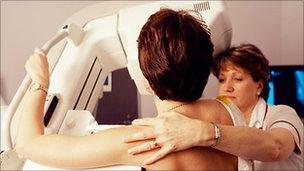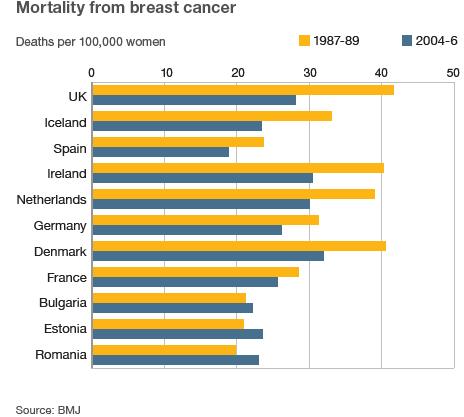Breast cancer deaths fall in UK
- Published

The fall is being put down to improvements such as screening
Breast cancer deaths have fallen in the UK since the 1980s, but mortality rates from the disease continue to be among the highest in Europe, a study shows.
The review of 30 countries, led by French researchers, showed the UK rate dropped by about a third, thanks to better care and speedier diagnosis.
The number of UK deaths caused by breast cancer fell to 28.2 per 100,000 - equivalent to 12,000 deaths per year.
The government said more progress, such as earlier diagnosis, was still needed.
Researchers looked at the rate at which breast cancer was highlighted as a cause of death from 1987-9 and compared that with 2004-6, the British Medical Journal reported.
Overall the mortality rate across the 30 countries fell by a fifth to 24 per 100,000 deaths.
Spain had the lowest rate at 18.9. The UK, by comparison, fell from 41.6 to 28.2 per 100,000.
'Terrific boost'
But despite the progress, the UK was still lagging behind countries such as Romania and Estonia as well as the likes of Germany and France.
The researchers at France's International Prevention Research Institute said the falls seen in most countries could be attributed to faster diagnosis and better quality care - although they admitted some variations in performance could be down to the different way deaths are recorded.
They said they would expect the UK death rate to continue improving and finally reach the top performers, although they added lifestyles may be hampering progress to some extent.
Factors such as drinking, obesity and the age at which a woman has children all influence the likelihood of breast cancer developing.
Hilary Tovey, Cancer Research UK's policy manager, hailed the "great progress" being made.
But she said: "The UK has seen greater decreases in the number of women dying from breast cancer than many other European countries over this period, though this is partly because death rates were relatively high in the 1980s."
Former breast cancer patient Marilyn Morris told the BBC that the report's findings would encourage people fighting the disease.
"It will be a terrific boost to anybody that's diagnosed with breast cancer just to know that there is hope. Things have got so much better recently and monthly there's progress being made, so anything that gives people hope is wonderful news," she said.
The findings chime with research into cancer survival rates - another measure of how well health services are performing.
Since the 1980s, there have been a number of significant changes to breast cancer care, including the introduction of the screening programme in 1988 and, more recently, a host of waiting time targets.
A spokesman for the Department of Health said: "The rapid drop in breast cancer mortality rates shows that the changes the NHS made in treatment, screening and access to drugs have really made a difference.
"However, England's breast cancer mortality is still lagging behind that of other countries, which is why we are focusing on improving outcomes and achieving earlier diagnosis."

- Published12 July 2010